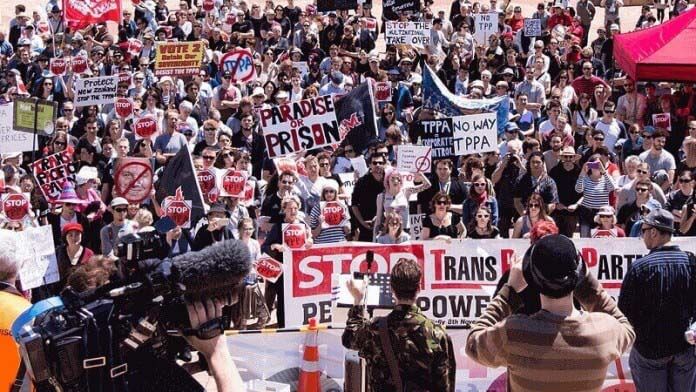The TPP is now one step closer to becoming a terrifying reality


This post was originally published on February 10, 2016.
*2/11/2016 update: The EFF, Public Citizen, Fight for the Future, and the Sierra Club are hosting a reddit AMA. Learn more about the TPP and how you can get involved!
(To see our previous coverage of the TPP, click here.)
On February 4th, representatives from 12 different Pacific Rim countries gathered in a small casino in Auckland, New Zealand, to officially sign the TPP.
One of the most controversial trade deals in history has taken another step forward, and despite thousands of protesters around the world, not a peep was heard in Congress.
What Is the TPP?
Known as the Trans-Pacific Partnership, the TPP is one of the biggest (and most secretive) trade agreements ever made. Its aim is to boost trade relations between the United States, Canada, Australia, New Zealand, Vietnam, Singapore, Malaysia, Mexico, Japan, Peru, Chile, and Brunei. These countries account for more than 40 percent of the world’s economy.
However, the secret negotiations and total lack of transparency have left some privacy advocates worried, and for good reason.
Advocacy groups like The Electronic Frontier Foundation have urged Congress to take action to ratify the TPP. Even Wikipedia, which is known for being neutral, has publicly come out in opposition to the act. In a blog post the company writes:
“TPP is a problematic treaty because it harms the public domain and our ability to create and share free knowledge. It is time for countries to partner for the policies and projects that benefit everyone, like the public domain, clear copyright exceptions and intermediaries empowered to stay out of content creation with good safe harbor protections.”
How Does the TPP Affect You?
Among other things, the TPP will harbor harsher intellectual property laws, most notably among copyright terms. Every country included in the partnership will be forced to change their laws to mirror the U.S.’s
Countries with less strict intellectual property rights will convert to the harsher, more criminalizing U.S. laws.
Privacy advocates warn these new stipulations will lead to:
- Ambiguous copyright laws
- Loss of autonomy over one’s legally owned device
- Unclear penalties for uploading songs and videos
- Less security for website owners
- Less secure devices and networks due to new source-code agreements
- Heavier penalties for copyright infringement
What Happens Next?
Now that the TPP has officially been signed, the 12 countries will use the next two years to either ratify or reject the pact. This means every country has to approve it before it can fully go into effect. Debate is expected, especially with the upcoming U.S. elections, though up till now very little opposition has been heard. Unfortunately, it’s likely the trend of hide-and-sign will continue.
The Best Offense Is a Good Defense
As always, we urge you to protect your privacy. Use a VPN to mask your IP address and encrypt your data, and take the pledge to speak out against the TPP.
Every voice counts. Make yours heard!
Featured Image: Neil Ballantyne (Rally against the Trans-Pacific Partnership Agreement (TPPA) in Wellington, New Zealand) [CC BY 2.0 (https://creativecommons.org/licenses/by2.0)], via Wikimedia Commons
Take the first step to protect yourself online. Try ExpressVPN risk-free.
Get ExpressVPN

















